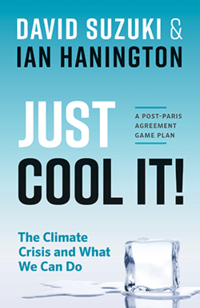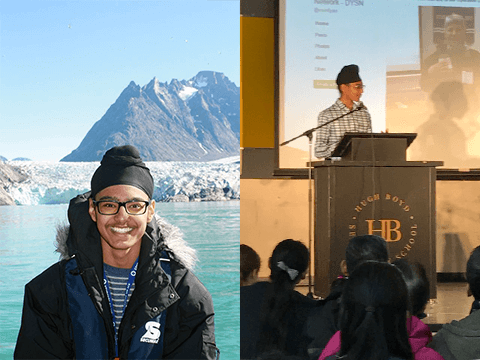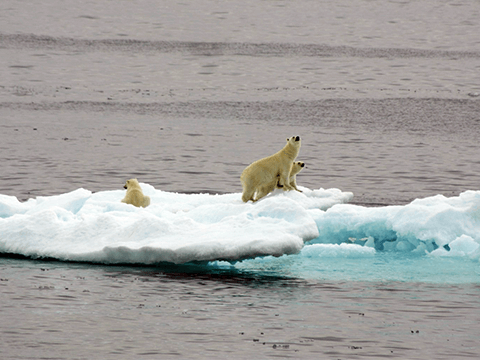David Suzuki's Blog, page 10
May 11, 2017
Long work hours don't work for people or the planet

(Credit: Thomanication via Flickr)
In 1926, U.S. automaker Henry Ford reduced his employees' workweek from six eight-hour days to five, with no pay cuts. It's something workers and labour unions had been calling for, and it followed previous reductions in work schedules that had been as high as 84 to 100 hours over seven days a week.
Ford wasn't responding to worker demands; he was being a businessman. He expected increased productivity and knew workers with more time and money would buy and use the products they were making. It was a way of spurring consumerism and productivity to increase profits -- and it succeeded. Ford, then one of America's largest employers, was ahead of his time -- most workers in North America and elsewhere didn't get a 40-hour workweek until after the Second World War.
Since standardization of the 40-hour workweek in the mid-20th century, everything has changed but the hours. If anything, many people are working even longer hours, especially in North America. This has severe repercussions for human health and well-being, as well as the environment.
Until the Second World War, it was common for one person in a household, usually the oldest male, to do wage work full time. Now women make up 42 per cent of Canada's full-time workforce. Technology has made a lot of work redundant, with computers and robots doing many tasks previously performed by humans. People get money from bank machines, scan groceries at automated checkouts and book travel online. Many people now spend most or all of their workdays in front of a computer.
Well into the 21st century, we continue to work the same long hours as 20th century labourers, depleting ever more of Earth's resources to produce more goods that we must keep working to buy, use and replace in a seemingly endless cycle of toil and consumerism.
It's time to pause and consider better ways to live.
Like shifting from fossil-fuelled lifestyles, with which our consumer-based workweeks are connected, it would have been easier to change had we done so gradually. In 1930, renowned economist John Maynard Keynes predicted people would be working 15-hour weeks within 100 years. We're clearly not on track to achieve that. As we reach the combined tipping points of overpopulation, resource overexploitation, environmental degradation and climate change, we may no longer have the luxury of taking our time to make necessary changes.
Rather than reducing work hours to spur consumerism, as Henry Ford did, we must reduce both. We have to get beyond outdated notions and habits like planned obsolescence, excessive packaging and production of too many unnecessary goods.
The U.K. think tank New Economics Foundation argues that a standard 21-hour workweek would address a number of interconnected problems: "overwork, unemployment, over-consumption, high carbon emissions, low well-being, entrenched inequalities, and the lack of time to live sustainably, to care for each other, and simply to enjoy life." It points out that "the logic of industrial time is out of step with today's conditions, where instant communications and mobile technologies bring new risks and pressures, as well as opportunities."
Economist David Rosnick, author of a 2013 Center for Economic and Policy Research study on work hours and climate change, argues that reducing average annual hours by just 0.5 per cent per year through shorter workweeks and increased vacation would "likely mitigate one-quarter to one-half, if not more, of any warming which is not yet locked-in."
Beyond helping break the cycle of constant consumption and allowing people to focus on things that matter -- like friends, family and time in nature -- a shorter workweek would also reduce rush-hour traffic and gridlock, which contribute to pollution and climate change. It could help reduce stress and the health problems that come from modern work practices, such as sitting for long hours at computers. And it would give people more options for family care. (David Suzuki Foundation employees enjoy a four-day workweek.)
A transition won't necessarily be easy, but it's time we stopped applying 20th century concepts and methods to 21st century life. Economic systems that require constant growth on a finite planet don't make sense. The fact that the world's richest 62 people now have more wealth than the poorest half of the world's population is absurd and tragic.
It's time for a paradigm shift in our economic thinking.
David Suzuki's latest book is Just Cool It!: The Climate Crisis and What We Can Do (Greystone Books), co-written with Ian Hanington.
Hey! Want more DSF? Join David Suzuki on Facebook

Will Trump trump Canada and save the monarchs?

Over the past 20 years, approximately 90 per cent of the monarch butterflies that migrate between Mexico and Canada have disappeared. In the 1990s, about one billion individual butterflies made the epic, multi-generational trek from Canada to Mexico. By 2013 the population had plummeted to 35 million. After a couple of years of modest improvement, the monarch population dropped by 22 million again last year.
In the U.S., the response from government and the conservation community has been strong. In 2015, $20 million was allocated for research conservation projects. Regional and national targets were set -- including an ambitious goal of restoring 200,000 hectares of monarch habitat, stretching from Mexico to Minnesota.
While the Trump administration has been rumoured to have considered banning bad mariposas and probably doesn't love bees and butterflies the way former president Barack Obama and his family did, it appears the White House's pollinator garden has been spared. Encouraging news.
What has been happening in Canada? There has been plenty of buzz about monarch decline, and action at the grassroots level. Citizens and community groups throughout the monarch's Canadian migratory range have sprung into action, including the David Suzuki Foundation, with its Got Milkweed and L'effet Papillon campaigns. In Ontario, milkweed has gone from being listed as a "noxious" weed to becoming one of the most sought-after native plants at garden centres.
However, despite the attention and local action, the federal government has been missing in action. No big announcements at all, unless you count the heartfelt note from federal Minister of Environment and Climate Change Catherine McKenna, calling on Canadians to act before monarchs go the way of passenger pigeons and buffalo. The minister became a passionate advocate for monarch recovery recently, following a visit with her children to the alpine Mexican forests where monarchs overwinter.
What is most curious is that the minister has failed to parlay her newfound commitment to saving monarchs into protecting them. In December 2016, scientists from Canada's Committee on the Status of Endangered Wildlife in Canada (COSEWIC) recommended that monarchs be protected as an endangered species under the federal Species at Risk Act. To make this happen, the minister needs simply to bring the COSEWIC recommendation to cabinet, which then would legally protect monarchs under federal law.
Similar to efforts in the U.S., Canada also needs to get serious about restoring habitat for monarchs and the rest of our native bees and butterflies. Money also needs to be allocated for research efforts, to assess and identify habitat and determine whether intensive use of pesticides like glyphosate is impacting monarchs, as it has been suggested in the U.S.
How can you help? Take two minutes to send a note to Minister McKenna and your member of Parliament here. Ask them to give monarchs the attention and support they need -- before it's too late.
Hey! Want more DSF? Join David Suzuki on Facebook

May 8, 2017
RESP: Porcelain pig in a puddle of oil

(Crédit : Alexander Dummer via Unsplash)
After dinner, my family sits at the table, talking about their day at school or work. As I watch my children, Gaspard and Félix, I like to ponder. I think about what will become of my sons when they grow up, what careers they will choose, what values will move them and what battles they will fight. Perhaps this is a universal pastime of all proud parents.
A little after our children were born, we were visited by an educational savings adviser. He came to sell us one of those famous plans that allow parents to set money aside tax-free. Once children are admitted to an institution recognized by the Ministry of Education, parents can spend the money on fees and educational expenses. Many parents in Quebec and Canada likely received similar visits, and like us, a few signed up for a Registered Education Savings Plan (RESP).
We began to fill the big piggy bank that would finance our children's education, and to which the government would contribute just as generously.
Last week, when we received our mail, we were taken aback by the Canadian Scholarship Trust financial statement. It showed the money that would pay for our kids' education, boosted by tax breaks, was partially invested in fossil fuels that directly threatened the future of our planet, and therefore that of our children.
In the investment portfolio, besides numerous federal, provincial and municipal bonds, we found bonds issued by companies that produce and transport oil sands bitumen. The portfolio also included investments in Milit-Air Inc., which operates training facilities for fighter pilots, as well as shares in Enerflex, Imperial Oil Limited and Suncor Energy. The latest online financial statement from Universitas Financial, another big player in the RESP, included a similar array of oil and pipeline companies: Enbridge, Suncor, Canadian Natural Resources Inc., Cenovus Energy, Inter Pipeline and others.
As we read these financial statements, we realized we were saving for the future and education of our children while investing in a way that compromised that very future. To ensure better prospects for their children, every month millions of Canadian families put a little of their money in the collective piggy bank that stretches across the country. The piggy bank that is in fact a pink porcelain pig with a slot on its back and its four legs stuck in a puddle of crude oil.
We need to help get it unstuck, just like the Laval University did recently, having decided to pull all its money from fossil fuels over the course of five years. By choosing the way of sustainable development and climate justice, Laval climbed to the top of the list of schools where I would be proud to see my children study. We can only hope other universities concerned about a greener and fairer future will follow the lead.
Some political and economic interests associated with the fossil fuel sector are undermining climate science and denying the work of many researchers and universities in the spirit of post-truth. Ironically, many universities conduct a lot of climate change and green energy research, which creates a fundamental contradiction with their choice of investments.
When I watch my children, and when I invest in their future, I dream that as a society, we will firmly engage in the inevitable transition toward clean, renewable energy. I hope this process will take place from top to bottom, from childhood to adulthood, from education savings to retirement savings.
Hey! Want more DSF? Join David Suzuki on Facebook

May 5, 2017
Just Cool It! - David Suzuki's new book on climate change available now

Climate change is the most important crisis humanity has faced, but we still confront huge barriers to resolving it. So, what do we do, and is there hope for humanity?
The problem itself is complex, and there's no single solution. But by understanding the barriers to resolving global warming and by employing a wide range of solutions -- from shifting to clean energy to planting trees to reforming agricultural practices -- we can get the world back on track.
Co-written by David Suzuki and David Suzuki Foundation Senior Editor Ian Hanington, Just Cool It! offers a comprehensive look at the current state of climate science and knowledge and the many ways to resolve the climate crisis, imploring us to do what's necessary to live in a better, cleaner future. When enough people demand action, change starts happening -- and this time, it could be monumental.
Order your copy today.
Hey! Want more DSF? Join David Suzuki on Facebook

Just Cool It!

Climate change is the most important crisis humanity has faced, but we still confront huge barriers to resolving it. So, what do we do, and is there hope for humanity?
The problem itself is complex, and there's no single solution. But by understanding the barriers to resolving global warming and by employing a wide range of solutions -- from shifting to clean energy to planting trees to reforming agricultural practices -- we can get the world back on track.
Co-written by David Suzuki and David Suzuki Foundation Senior Editor Ian Hanington, Just Cool It! offers a comprehensive look at the current state of climate science and knowledge and the many ways to resolve the climate crisis, imploring us to do what's necessary to live in a better, cleaner future. When enough people demand action, change starts happening -- and this time, it could be monumental.
Order your copy today.
Hey! Want more DSF? Join David Suzuki on Facebook

May 4, 2017
Research sheds light on dark corner of B.C.'s oil and gas industry

Infrared image of potent methane emissions from gas compressor station.
We've long known extracting oil and gas comes with negative consequences, and rapid expansion of hydraulic fracturing, or fracking, increases the problems and adds new ones -- excessive water use and contamination, earthquakes, destruction of habitat and agricultural lands and methane emissions among them.
As fossil fuel reserves become depleted, thanks to our voracious and wasteful habits, extraction becomes more extreme and difficult. Oilsands mining, deepsea drilling and fracking are employed because easily accessible supplies are becoming increasingly scarce. The costs and consequences are even higher than with conventional sources and methods.
Fracking involves drilling deep into the earth, and injecting a high-pressure stream of water, sand and chemicals to break apart shale and release gas or oil. In British Columbia, politicians tout liquefied natural gas as an economic panacea, a product we can export around the world to create jobs and prosperity at home. More than 80 per cent of B.C.'s natural gas is fracked, and as fracking increases, the percentage rises.
Of the many problems with the industry, methane emissions from fracked and conventional operations are among the most serious. Methane is at least 84 times more potent than carbon dioxide as a heat-trapping gas over the short term. Researchers estimate it's responsible for 25 per cent of already observed climatic changes. One difference between methane and CO2: Methane remains in the atmosphere for a shorter time -- around a decade, compared to many decades or centuries for CO2.
Methane's relatively short lifespan means reducing the amount entering the atmosphere will have major and rapid results. Cutting methane emissions from the oil and gas sector is one of the cheapest, most effective ways to address climate change. The technology to do so already exists. It's absurd that the industry is leaking the very resource it wants to sell.
Methane comes from a number of sources, including animal agriculture and natural emissions. Global warming itself means methane once trapped in frozen ground or ice is escaping into the air.
The oil and gas industry is one of the major emitters. A field study by the David Suzuki Foundation and St. Francis Xavier University found methane pollution from B.C.'s oil and gas industry is at least 2.5 times higher than B.C. government estimates.
In 2015 and 2016, Foundation researchers joined St. Francis Xavier University's Flux Lab under the supervision of David Risk, an expert in measurement, detection and repair of fugitive emissions. Using gas-detection instruments mounted on a "sniffer truck," they travelled more than 8,000 kilometres in northeastern B.C. They found methane emissions from B.C.'s Montney region alone are greater than what the provincial government has estimated for the entire industry! (Montney represents about 55 per cent of B.C.'s oil and gas production.) David Suzuki Foundation senior scientist John Werring followed up on and corroborated that research by measuring point-source methane emissions from more than 170 oil and gas sites.
The research, available in the journal Atmospheric Chemistry and Physics, found Montney operations leak and intentionally release more than 111,800 tonnes of methane into the air annually -- equivalent to burning more than 4.5 million tonnes of coal or putting more than two million cars on the road. Half of all well and processing sites in the region are releasing methane.
This research shows that the oil and gas sector is the largest source of climate pollution in B.C., surpassing commercial transportation -- and it contradicts claims that natural gas or LNG is a clean fuel or that it's useful to help us transition from other fossil fuels.
Given these results and other studies -- including one in Alberta that found the amount of methane leaking from Alberta operations in one year could heat 200,000 homes -- it's time for all levels of government to get industrial methane emissions under control.
Beyond existing commitments to reduce methane emissions by 45 per cent, governments must work to eliminate them from this sector by 2030, with strong regulations, monitoring and oversight. We need better leak detection and repair, improved reporting and enforcement, and methods to capture emissions rather than burning them.
Climate change is a serious issue, and methane emissions are a significant contributor. Getting them under control is a quick, cost-effective way to help address the problem. What's stopping us?
Tell the federal government to cut methane pollution
Hey! Want more DSF? Join David Suzuki on Facebook

David Suzuki Foundation applauds federal government's review of Canadian charities and political activities
OTTAWA (May 4, 2017) -- In 2012, the federal government provided resources to the Canada Revenue Agency to review how Canadian charities were conducting political activities. These activities relate to how charitable organizations communicate about government law, policies or decisions -- as opposed to partisan activities, which are not permitted.
One outcome of the 2012 initiative was that the Canada Revenue Agency initiated a series of political activity audits of charities. The David Suzuki Foundation was among those chosen for an audit, which was completed in early 2016.
In late 2016, the new federal government initiated a consultation process aimed at clarifying the rules governing political activities undertaken by charities, and appointed a five-person panel to review the consultation feedback and make recommendations to government about how to move forward. David Suzuki Foundation CEO Peter Robinson was appointed to the panel. DSF was the only organization represented on the panel that had experienced an audit, and was able to bring our experience to the process.
Today, the government released the report, which calls on the federal government to:
Revise the CRA's administrative position and policy to enable charities to fully engage in public policy dialogue and development.
Implement changes to the CRA's administration of the Income Tax Act regarding compliance and appeals, audits and communication and collaboration to enhance clarity and consistency.
Amend the Income Tax Act by deleting any reference to non-partisan "political activities" to explicitly allow charities to fully engage, without limitation, in non-partisan public policy dialogue and development, provided those activities are subordinate to and further their charitable purposes.
Modernize the legislative framework governing the charitable sector to ensure a focus on charitable purposes rather than activities, and adopt an inclusive list of acceptable charitable purposes to reflect current social and environmental issues and approaches.
"We are pleased that the government is taking this issue seriously," Robinson said. "The ability of Canadian charities to speak out on issues of public policy and legislation is critical to a healthy democracy. We are also honoured that the David Suzuki Foundation was involved in providing strong recommendations to government about the role of charities in conducting political activities in Canada."
- 30 -
For more information, please contact:
Brendan Glauser
David Suzuki Foundation
604-356-8829
bglauser@davidsuzuki.org
Hey! Want more DSF? Join David Suzuki on Facebook

May 2, 2017
REaDY Summit 2017 offers hope for a friendlier, greener future

Abhayjeet Singh Sachal is a Grade 10 student at Seaquam Secondary School and a member of the Delta Youth Sustainability Network.
Abhayjeet Singh Sachal (Abhay), a Grade 10 student at Seaquam Secondary School in Delta, was the keynote speaker at this year's REaDY Summit. Minutes in, it was clear there's something amazing about Abhay.
He shared stories from a recent, life-changing experience: joining 120 students and 80 educators from Students on Ice (a scholarship-granting non-profit organization), to witness climate change in real time.
During the Arctic voyage last year, Abhay saw polar bears sitting on shrinking icebergs and ice fjords, which he described as "bone-chilling and eye-opening."
 Credit: Abhay Singh Sachal
Credit: Abhay Singh Sachal
Most importantly, he made new friends -- Inuit students who showed him how climate change has affected their lives.
"Melting ice has harmed their traditional way of hunting," Abhay told the REaDY Summit audience of 250. "Studies from Inuvik showed that the temperature in the tundra has doubled and that the snow melts months earlier than it used to. This is extremely detrimental to the Inuit way of life."
According to Abhay, melting glaciers are also harming the Yukon, where the Slims River disappeared in four days in 2016.
Abhay expressed frustration that his Inuit friends worry about a plethora of health issues that don't occur to most people in Canada, such as food and water insecurity.
"We think of Canada as a leader, but clearly these communities are suffering and no one knows about it or wants to do anything about it," Abhay said.
Abhay is not content to leave things the way they are.
After he returned from his Arctic excursion, he created Break the Divide, a youth group that aims to break societal divisions around the world. He hopes sharing his experience is one way to make Canada's next 150 years better and stronger than the last 150.
Judging by the response of his peers, Abhay and his movement are clearly onto something.
To learn more about Students on Ice, check out this film or watch this video.

This is the sixth year the David Suzuki Foundation has partnered with the City of Richmond and the Richmond School District to co-host the Richmond Earth Day Youth Summit. Last year, the youth-led environmental conference won the Our Canada Project Award, for its Learning for a Sustainable Future partnership with RBC.

Hey! Want more DSF? Join David Suzuki on Facebook

Save monarch butterflies

Hey! Want more DSF? Join David Suzuki on Facebook

Executive director of Doctors Without Borders / Médecins Sans Frontières Canada named CEO of David Suzuki Foundation
VANCOUVER, B.C. (May 2, 2017) -- The David Suzuki Foundation announced today the appointment of a new chief executive officer. Stephen Cornish, executive director of Doctors Without Borders / Médecins Sans Frontières Canada, will join the Foundation on November 1. He succeeds Peter Robinson, who served as the Foundation's CEO for almost a decade, creating a strong national organization operating in both English and French.
"Joining the David Suzuki Foundation is an amazing opportunity," Cornish said. "Over my career, I've been driven by the need to reduce suffering and to contribute toward social and environmental progress. This iconic Canadian organization truly has the power to affect significant change in this country, and well beyond."
Cornish joins the Foundation after five years as executive director of MSF, where he led tremendous change, including overseeing strategic growth by improving public recognition of MSF in Canada, growing the number of staff by 40 per cent to support field operations globally, and increasing revenue generating activities by 76 per cent. He has also held senior leadership positions with CARE Canada and the Canadian Red Cross, and was named one of the top 30 charity CEOs on social media in 2016. Cornish has been at the front lines of crises throughout the world, problem solving under intense pressure.
Cornish is a board member of Youth Challenge International and an honorary board member of Canadian Physicians for the Environment. He holds a BA High Honours from Carleton University plus a master's degree in Global Risk and Crisis Management from Université de la Sorbonne, and is fluent in French and Spanish.
David Suzuki, who co-founded the Foundation with his wife Tara Cullis, is delighted by the appointment. "When we created the David Suzuki Foundation more than 25 years ago, we did so on the principle of interconnectedness. Just as diversity in nature is crucial for our survival, so it is within an organization, within a movement. We feel proud the Foundation is able to attract the kind of talent that Stephen demonstrates. The issues facing us are more grave than ever and we need the continuity of strong leadership."
Cornish's immediate priorities as incoming CEO include strengthening the campaign for a Federal Environmental Bill of Rights, promoting community-based renewable energy initiatives, deepening relationships with Indigenous peoples and protecting biodiversity.
"The David Suzuki Foundation Board of Directors is pleased that Stephen has accepted this opportunity," Board Chair Peter Ladner said. "He possesses the full range of skills necessary for a smooth transition into the next chapter of the Foundation's story. It's vital to have someone of Stephen's calibre guiding the organization toward its urgent environmental impact goals."
- 30 -
For more information or to arrange an interview, please contact:
Tracey Friesen, Director of Communications & Engagement
David Suzuki Foundation
(778) 772 3401
tfriesen@davidsuzuki.org
Hey! Want more DSF? Join David Suzuki on Facebook

David Suzuki's Blog
- David Suzuki's profile
- 247 followers



